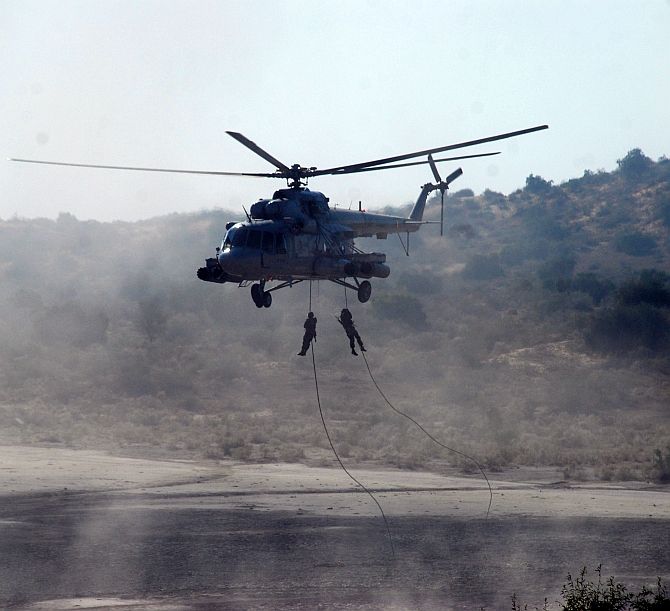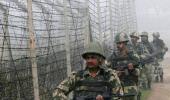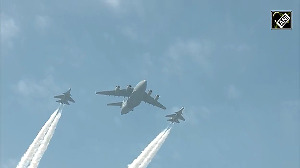'Forget about sending in troops or raining down missiles, but don't rule out occasional covert operations that target specific terrorist leaders.'
South Asia expert Michael Kugelman on India's likely response after the Uri attack.
 Sunday's horrific terrorist attack in Uri, which killed 17 Indian soldiers, has put Prime Minister Narendra Modi in a very difficult position.
Sunday's horrific terrorist attack in Uri, which killed 17 Indian soldiers, has put Prime Minister Narendra Modi in a very difficult position.
The Indians are understandably outraged about the tragedy, and many are calling for immediate action to be taken against Pakistan. India's military has claimed that the Pakistani terror group Jaish-e-Mohammed was behind the attack.
It may be premature to point the finger at Pakistan. One can't rule out the possibility that Kashmiri militants, seeking revenge for the brutal tactics of the Indian security forces in Jammu and Kashmir, pulled off the operation.
Still, it beggars belief that local rebels could have executed such a well-coordinated and devastatingly lethal attack.
There's good reason to assume the attack was planned across the border, or at the least featured some level of involvement from actors in Pakistan.
Modi now faces tremendous pressure to launch some type of befitting response -- particularly because India has repeatedly declined to do so after many previous attacks that it traced back to Pakistan, including attacks much deadlier than Uri.
Recall the attack on Parliament in 2001; the bombing of India's embassy in Kabul in 2008; the Mumbai massacre of 2008; the Pathankot siege earlier this year.
New Delhi is also under great pressure to stage a muscular response this time around because the government's verbal response to the attack has been particularly sharp and threatening.
Just hours after the assault, Home Minister Rajnath Singh tweeted that 'Pakistan is a terrorist state and should be identified and isolated as such.'
Even by the ugly standards of the war of words that constantly plays out between India and Pakistan, Singh's statement was exceedingly harsh.
In effect, India has upped the ante with its exceptionally bellicose rhetoric. Failing to mount a robust response will make it look silly.
But New Delhi is confronted by a conundrum: It's never been under more pressure to take action, yet at the end of the day its options are limited.
War, despite full-throated pleas from some Indian hawks, is not an option, thanks to the nuclear weapons issue.
Even punitive measures short of all-out war -- such as targeted airstrikes on terrorist facilities -- would be prohibitively risky for that same reason.
Additionally, as George Perkovich and Toby Dalton argued cogently in a Washington Quarterly article last year, there would be capability concerns -- concerns that have not applied to the United States and Israel in their own efforts to use airstrikes as a counterterrorism tactic.
Perhaps most dangerously, punitive Indian actions would play right in to the Pakistani security establishment's 'India-is-an-existential-threat-and-is-out-to-get-us' narrative, and they could conceivably prompt Pakistan to sponsor additional attacks in India.
Any Indian gains from taking out some terrorists in Pakistan via airstrikes would be purely tactical, and ultimately quite ephemeral.
Let's assume India opts for business as usual -- tough talk followed by an absence of action. Many -- including some of the BJP party base -- would be unhappy. Still, aside from some short-term deleterious political consequences, there could be considerable advantages that accrue from sticking with a policy of strategic restraint.
New Delhi would be better able to focus on its economic reform plan and other domestic matters. India would be seen as a responsible and restrained rising power taking the high moral ground.
And most importantly, it would not have to contend with the very real threat of an upsurge in attacks on its soil.
All this said, there's still good reason to believe that India is entering a bold new era in its relations with Pakistan -- one in which New Delhi refuses to sit meekly in the face of Pakistani provocations.
Its decision to express support for the people of Balochistan, and to call out the Pakistani military for its abuses there, are clearly meant to push back against Pakistani accusations of Indian destabilisation of that troubled province.
Meanwhile, India's decision some months back to transfer several fighter helicopters to Afghanistan -- the first time India has sent lethal military hardware to Afghanistan -- telegraphs a new willingness to ramp up security cooperation with its close friend in Kabul, no matter how much this may anger Pakistan.
In this vein, India may well decide to introduce some subtle means of punishing Pakistan into its policy toolkit. Forget about sending in troops or raining down missiles, but don't rule out certain types of furtive activities -- including occasional covert operations that target specific terrorist leaders or facilities (though to be sure, India's operational and intelligence capacities in this regard are questionable).
India is reportedly trying to acquire armed drones from the United States. If it succeeds, its capacity for carrying out covert strikes would be significantly enhanced -- and particularly if Washington helps out with intelligence support.
Ultimately, however, all this talk of to-retaliate-or-not-to-retaliate risks putting the cart before the horse.
India should certainly weigh its options, but it should ideally hold off on embracing any course of action until a proper investigation of the Uri attack has been conducted.
Decisions of great magnitude and consequence are best made after more information is known, and once the raw emotions that accompany national traumas and tragedies have had time to subside.
Michael Kugelman is the Senior Associate for South Asia with the Woodrow Wilson International Centre for Scholars in Washington, DC. He can be reached at michael.kugelman@wilsoncenter.org or on Twitter @michaelkugelman











 © 2025
© 2025